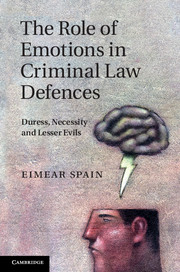3 - Coping with uncertainty
Published online by Cambridge University Press: 07 October 2011
Summary
There has always been an understanding of circumstances of external compulsion that lead one to break the letter of the law. However, the law has persistently struggled to accommodate the defences of necessity and duress; indeed, a debate continues today as to the very existence of the defence of necessity in some jurisdictions. A brief reading of classical and institutional writers demonstrates that the law's understanding of the defences in question has evolved slowly over time and illustrates the confusion and inconsistencies, typified by the works of Blackstone, which have blighted the debate. The challenge facing the law is to work out when, how and why the law should exculpate those who act due to threats or dire circumstances, a dilemma which has origins deep in the legal past.
Although Arnolds and Garland have suggested that, as a result of the lack of case law, ‘it is impossible to demonstrate with any degree of satisfaction an historical development of the law of necessity’, this chapter aims to ascertain if such a defence was recognised at any time since records began and, if so, what form it took. Prior to the eighteenth century, reported case law was fraught with insufficiencies, which led in turn to the importance of employing institutional writers who were typically immersed in the everyday workings of the courts and drew on their experience in courts to inform their writings and, as such, constitute very valuable historical sources. The following section draws on these sources to explore chronologically the emergence and evolution of the defences. It traces the diverging views on this area over time in an attempt to ascertain if there is authority for asserting that those acting under duress or necessity should have their charges or sentences reduced rather than having a full defence to criminal charges available to them.
- Type
- Chapter
- Information
- The Role of Emotions in Criminal Law DefencesDuress, Necessity and Lesser Evils, pp. 113 - 148Publisher: Cambridge University PressPrint publication year: 2011



